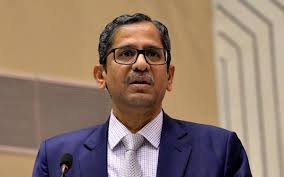
Even as the debate continues to rage over the recent judgement of Andhra Pradesh high court order that the state assembly had no legal competence to enact laws on the Amaravati capital issue, chief justice of India Justice N V Ramana on Saturday said judiciary would never interfere in the legislative affairs.
Ramana was speaking at a joint conference of chief ministers of various states and chief justices of High Courts at Delhi’s Vigyan Bhawan. Prime Minister Narendra Modi inaugurated the discussion.
He said his remarks about legislative scrutiny during the last Independence Day were misconstrued, and he did not want to interfere in the legislative sphere. He, however, reiterated the need for proper legislative scrutiny before passing laws.
Justice Ramana said that members of the judiciary should be mindful of a “lakshman rekha”, or a boundary, while discharging their duty.
“The Constitution provides separation of power among three organs and the harmonious function between three organs strengthens democracy,” the CJI said, adding: “While discharging our duty, we should be mindful of ‘lakshman rekha’.”
He, however, felt that the governments are not implementing the court judgements.
The “deliberate inaction by governments” despite court judgements was not in the best interest of the country’s democracy, he said.
Last month, the Jagan Mohan Reddy government held a day-long debate on the interference of judiciary in the legislative affairs in the state assembly and felt that the high court directions on the incompetence of the legislature to pass laws was nothing but “crossing the limits.”
At the same time, the high court has also expressed concern over the non-implementation of its orders by the Jagan government and imposed jail term to eight IAS officers. Later, it commuted the punishment to social service.
Justice Ramana also voiced his concern over the misuse of Public Interest Litigations (PIL).
He said PILs have now turned into "Personal Interest Litigation" and are used to settle personal scores, he said, adding that courts are now highly cautious in entertaining the same.














